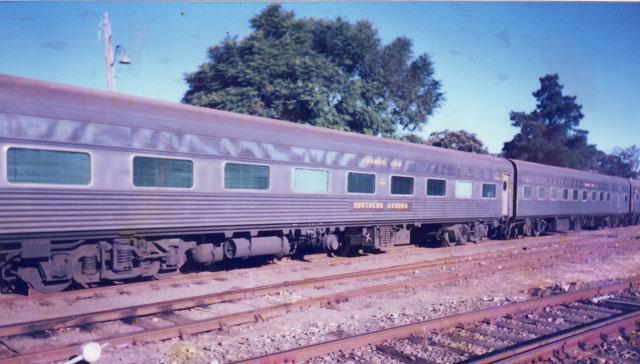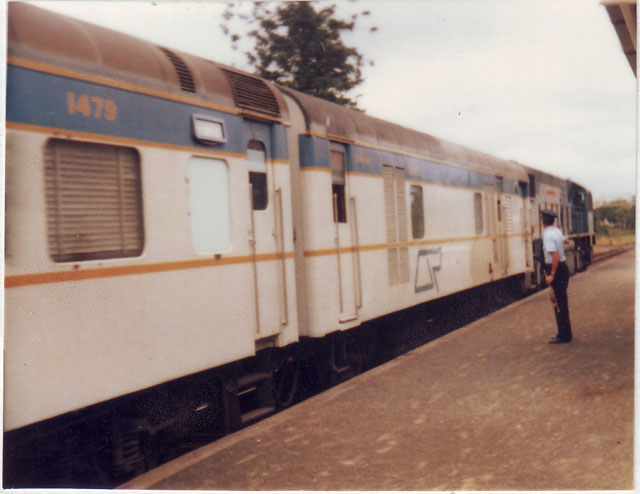
'The Southern Aurora' was the title of Mark Tronson, the Footplate Padre's 1989 book. It detailed everything about this iconic express sleeper train which travelled overnight between Melbourne and Sydney, in each direction, seven nights a week, from the sixties to the eighties.
One of the chapters entitled 'Old Time Drivers' tells of the earliest Salaried Drivers of the diesel Southern Aurora who had pedigrees from the grand days of steam. These 'classic' train drivers were only known by their surnames; they were distinguished gentlemen who were recognised in the community. They always wore white shirts and neck ties when on the diesel locomotive (on steam trains they would wear a sweat rag as a scarf around their necks).
One of the very first drivers to take charge of the Southern Aurora was Mr Butler, an engineman based in Goulburn. Not even the District Locomotive Engineer (DLE) would call him by his first name, and the fireman was never allowed to have a cuppa from Mr Butler's billy. During the very first time Mr Butler took the Southern Aurora out, the guard foolishly climbed into the cabin only to be told he wasn't invited on the locomotive - he was to speak to Mr Butler from ground level.
When the Locomotive Inspector asked the fireman to request permission to come aboard, Mr Butler said nothing for a long fifteen seconds and then grunted his approval and returned to what he was doing.
Another of these old time drivers from Goulburn was Mr Brown. His bearing was such that a fireman was not permitted to walk alongside him, only ever behind him. He would never condescend to do any part of the fireman's work even when working steam, when it often took the fireman three trips to collect the necessary items to get a steam engine fired up.
Steam engines didn't have speedometers; drivers drove to time where the driver's watch was the critical component. Accelerating and braking was done by timing from landmarks alongside the railway line. Diesels, however, had these new fangled instruments which these drivers considered to be agents of the devil, which took all the skill out of driving trains. When driving a diesel, Mr Brown would cover the speedometer with a large rag.

Passenger’s comments
Passengers on the Southern Aurora would inevitably make comments to railway authorities about the delicacy and smoothness of the ride when Mr Brown was driving; once there were twenty such reports on the one trip. Certainly, Mr Brown was a railway legend in his lifetime, equivalent to any movie star of the golden era.
Gentlemanliness and attention to doing their job as well as possible were customs he and Mr Butler had kept as they progressed from the age of steam to Salaried Drivers of diesel.
There are many ways to develop good customs in your everyday Christian life says the Footplate Padre; for example 'daily bible reading', 'prayer' and 'Christian service'. If possible, you can show a positive example to your children and grandchildren by observing these customs.

 Dr Mark Tronson is a Baptist minister (retired) who served as the Australian cricket team chaplain for 17 years (2000 ret) and established Life After Cricket in 2001. He was recognised by the Olympic Ministry Medal in 2009 presented by Carl Lewis Olympian of the Century. He mentors young writers and has written 24 books, and enjoys writing. He is married to Delma, with four adult children and grand-children. Dr Tronson writes a daily article for Christian Today Australia (since 2008) and in November 2016 established Christian Today New Zealand.
Dr Mark Tronson is a Baptist minister (retired) who served as the Australian cricket team chaplain for 17 years (2000 ret) and established Life After Cricket in 2001. He was recognised by the Olympic Ministry Medal in 2009 presented by Carl Lewis Olympian of the Century. He mentors young writers and has written 24 books, and enjoys writing. He is married to Delma, with four adult children and grand-children. Dr Tronson writes a daily article for Christian Today Australia (since 2008) and in November 2016 established Christian Today New Zealand.
Mark Tronson's archive of articles can be viewed at http://www.pressserviceinternational.org/mark-tronson.html

Dr Mark Tronson - a 4 min video
Chairman – Well-Being Australia
Baptist Minister 45 years
- 1984 - Australian cricket team chaplain 17 years (Ret)
- 2001 - Life After Cricket (18 years Ret)
- 2009 - Olympic Ministry Medal – presented by Carl Lewis
- 2019 - The Gutenberg - (ARPA Christian Media premier award)
Gutenberg video - 2min 14sec
Married to Delma for 45 years with 4 children and 6 grand children